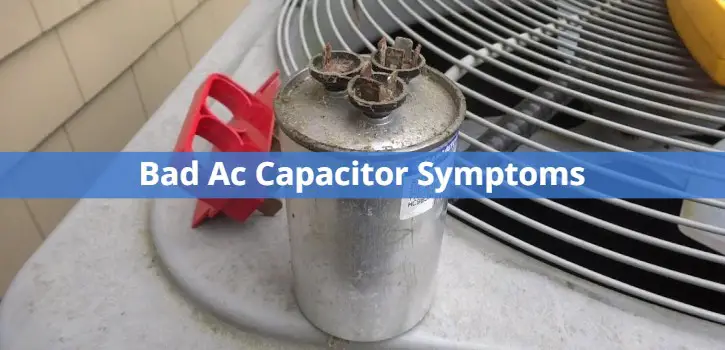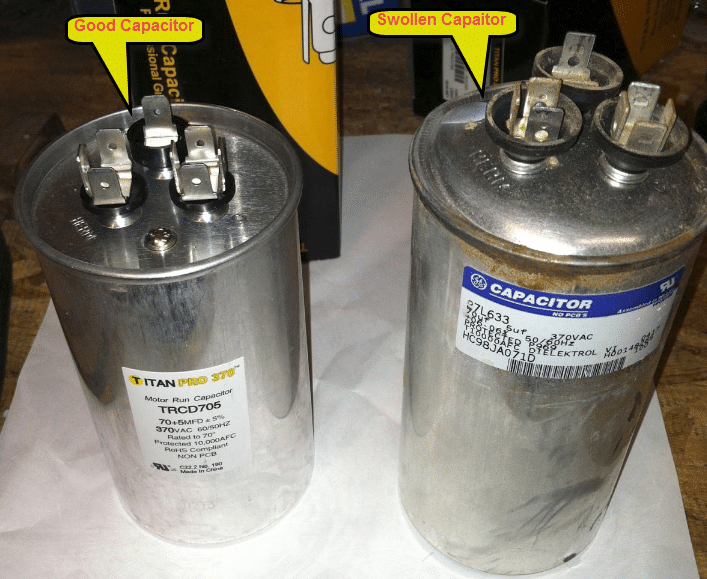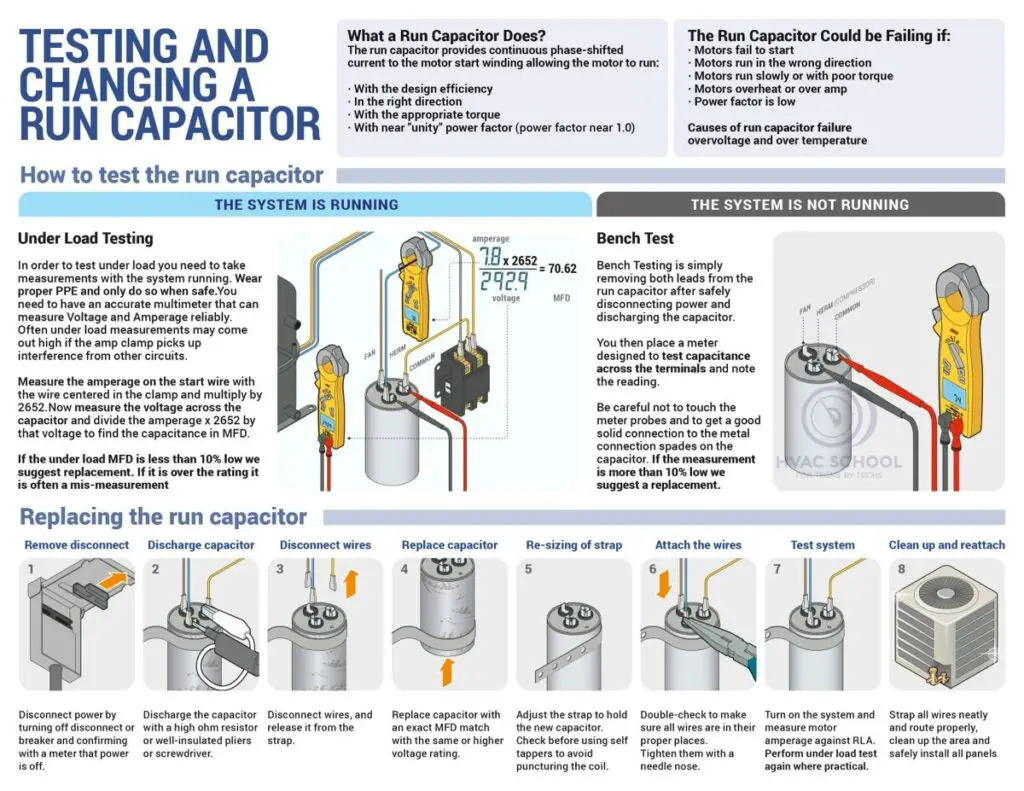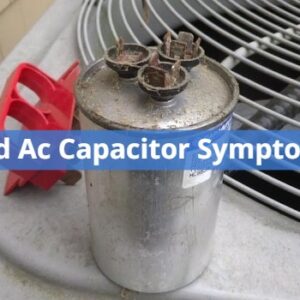Introduction to AC Capacitor Functionality
The fundamental role of a capacitor in an air conditioning (AC) system is to store energy and manage the flow of electrical current, supporting the operation of the motor for efficient performance.
Understanding the role of a capacitor in an AC system
If you want to understand the consequence of a faulty capacitor, you must first recognize its purpose. The capacitor in your AC system stores and releases energy to keep the motor running smoothly. The cycle of storing and releasing energy assures that your AC provides a consistent stream of cooled air.
How a healthy capacitor operates
A healthy capacitor backs the smooth operation of your AC’s motor. It assists in stabilizing the voltage and boosting the torque of the motor during the start-up, ensuring optimal functionality.
Common signals of a faulty capacitor
With a bad capacitor, your AC might not run as effectively – or at all. Common indications of a faulty capacitor include not starting up, irregular cooling cycles, or humming noises. Just remember, a faulty capacitor might let the motor run, but not efficiently.
It’s essential to replace any faulty capacitor as soon as possible for your AC to function well. Regular maintenance can keep your AC performing at its peak for longer periods.

This image is property of www.pickhvac.com.
Understanding if your AC will still run with a bad capacitor
In exploring whether your air conditioning (AC) unit will still operate with a bad capacitor, it is important to comprehend the relationship between the AC unit and its capacitor.
Sequence of operations in a normal-functioning AC unit
Under normal circumstances, the capacitor in your AC unit acts as a reservoir for energy, storing it and releasing it into the unit as necessary to maintain optimal performance.
Impact of a bad capacitor on AC performance
When the capacitor starts to go bad, it can seriously impact the ability of the AC unit to function properly. The unit may have difficulty starting or might not even turn on at all. Unfortunately, a faulty capacitor can make your AC run intermittently or not run at all.
Identifying the symptoms of a problematic capacitor
Recognizing the signs of a bad capacitor early on can help prevent costly repairs. If your AC unit is making strange noises, acting erratic, or simply not providing the cooling you expect, it could be a sign of a bad capacitor.
Remember, understanding the role of the capacitor and how it impacts AC performance can help in diagnosing problems early. However, for clarity and safety, always consult a professional for AC repairs.

This image is property of myhvacprice.com.
Understanding if Your AC Will Still Run With a Bad Capacitor
Are you wondering if your AC will still function properly with a faulty capacitor? Well, this article aims to answer your queries!
Understanding the technical aspects and how your AC unit operates can help you comprehend how the bad capacitor can affect your AC efficiency and its lifespan.
How a Bad Capacitor Affects Current Flow
A capacitor is designed to store and release electrical energy as needed by the motor in your AC unit. Therefore, a malfunctioning capacitor can disrupt this process, causing your AC to run inefficiently or not to run at all.
Impact of a Bad Capacitor on the AC Motor Windings
A bad capacitor may cause the motor in your AC unit to overheat, thus stressing the motor windings. Over time, this can lead to premature failure of the motor.
Effect of a Bad Capacitor on the Lifespan of Your AC
Besides motor issues, a faulty capacitor can also shorten the lifespan of your AC. A bad capacitor puts unnecessary stress on the parts of the AC, leading to frequent breakdowns and eventual complete failure.
Remember, if you suspect a bad capacitor is causing your AC problems, it’s better to consult a professional for an accurate diagnosis and repair. If you’ve been wondering whether your Air Conditioner (AC) will still operate with a defective capacitor, the answer isn’t a simple yes or no. Various factors come into play that can influence how your AC behaves with a faulty capacitor.
Conditions under which an AC might run with a defective capacitor
There are certain conditions where your AC might still run with a faulty capacitor. If the capacitor is slightly damaged or is just beginning to fail, your AC might still operate, but it’s likely not performing optimally. These issues can often start subtly, with just a minor decrease in cooling efficiency that you might not even notice.
Long-term implications of running an AC with a defective capacitor
Running your AC with a faulty capacitor for a prolonged period can result in further damage. The capacitor’s function is to store and release electrical energy to help the AC work efficiently. A defective capacitor may cause the AC to work harder, leading to overheating and potentially serious damage.
Factors influencing the efficiency of an AC with a bad capacitor
The level of damage on the capacitor significantly impacts the efficiency of your AC. Other factors include the model of your AC, the age of the AC, and environmental factors like the temperature and humidity levels where the AC is located. It’s vital to seek professional help when you suspect a faulty capacitor to avoid further damage.

This image is property of hvacrschool.com.
Proactive Measures for Dealing With Bad Capacitors
Your air-conditioner (AC) unit possesses crucial components known as capacitors. These devices store and release electrical energy, assuring the smooth running of your AC. However, when a capacitor is faulty or bad, it can affect your AC’s performance. But will your AC still run with a bad capacitor? Let’s find out.
Routine Maintenance Practices for Detecting Bad Capacitors
Conducting routine maintenance checks on your AC system aids in early detection of a bad capacitor. You might notice signs like an unusually high electric bill, poor cooling performance, or your AC unit struggling to start. Regular checks ensure your AC runs efficiently and lessen the impact of a bad capacitor.
When to Seek Professional Help for Capacitor Replacement
While DIY practices can be satisfying, it’s crucial to know when professional help is needed. Capacitors hold dangerous charges, even when power is disconnected. Therefore, if you sense a bad capacitor, it’s best to involve a qualified technician to prevent any undue risks.
How to Replace a Bad Capacitor
Bad capacitor replacement involves discharging the stored electricity, removing the faulty capacitor, and fixing the new one correctly. An experienced AC technician will perform these complicated tasks proficiently, ensuring your AC’s optimal performance.
Remember, understanding your AC’s operation and attending to issues promptly ensures its longevity and efficient performance. Conducting frequent maintenance checks might sound tedious, but it saves you from spending hefty amounts on extensive repairs later.
Understanding Capacitor Ratings and Specifications
You might be wondering, “Will my AC still run with a bad capacitor?” The simple answer to this question is, it might, but not efficiently. Moreover, running your AC with a faulty capacitor can lead to more serious problems down the line. Understanding capacitor ratings and specifications is crucial to prevent these issues and to keep your AC running optimally.
Reading Capacitor Labels Correctly
Each capacitor comes with a label showing its specifications. This includes its capacitance (measured in microfarads, μF), its tolerance range and the voltage it can safely handle. It’s important to note these specifications as using a capacitor with the wrong ratings can harm your AC.
Choosing the Right Capacitor for Your Specific AC Model
Just like every AC model is unique, the capacitor that each one needs varies as well. Check your AC’s manual or consult a professional to know the correct capacitor to use.
Importance of Adhering to Manufacturer’s Capacitor Specifications
Never underestimate the significance of adhering to the manufacturer’s capacitor specifications. Using improper specifications can not only decrease your AC’s efficiency but could also lead to its breakdown. Remember, understanding your AC and taking care of it accordingly can help ensure a long-living AC system.
Your air conditioning unit relies on several components to function properly, and one of those key components is the capacitor. So what happens if this capacitor goes bad? Will your AC still run? While it’s possible for the unit to continue operating in the short term, a bad capacitor will likely cause your AC to function inefficiently, exhibit poor cooling, or even completely shut down.
What to Expect After Capacitor Replacement
After a faulty capacitor has been replaced, you should notice immediate improvements. Your AC unit should start running more smoothly and providing better cooling performance. On hot days, these improvements may feel like a godsend.
Monitoring Your AC After Capacitor Replacement
The work doesn’t end after the capacitor has been replaced, though. It’s important to keep a close eye on your AC unit. Monitor it for any unexpected noises, inconsistent cooling, or signs of overheating.
Potential Issues After Replacing a Capacitor
While a new capacitor will certainly improve your AC performance, it’s not a guarantee against potential issues down the line. Regular maintenance is essential and if problems persist after replacement, have a technician examine your AC unit. It could indicate underlying issues beyond a bad capacitor.
So, will your AC still run with a bad capacitor? Probably, but not for long and not very well. Replace the capacitor and keep your cool, literally and figuratively.
Conclusion: Balancing AC Functionality and Capacitor Health
In conclusion, understanding the health of your AC’s capacitor is essential for its proper functioning. The AC system may still run with a bad capacitor, but its performance will be heavily compromised and it may eventually cause long-term damage to other components of the AC.
The crucial balance between capacitor health and AC performance
A bad capacitor can cause your AC system to malfunction or operate inefficiently, leading to higher than normal energy bills and sub-optimal cooling. Thus, it’s crucial to balance between your AC’s functionality and the health of its capacitor.
Making informed decisions on AC maintenance and capacitor replacement
Being aware of your AC’s capacitor health helps you to take necessary action when required. Replacement of a bad capacitor is a relatively straightforward and cost-effective way to prolong your AC’s lifespan and maintain its efficiency.
Why understanding capacitor functionality is significant for every AC owner
The capacitor plays a significant role in the start-up and operation of your AC. Understanding its functionality, the symptoms of its failure, and the impacts of using a bad capacitor allows you to diagnose any potential problems and make informed decisions on your AC’s maintenance.

